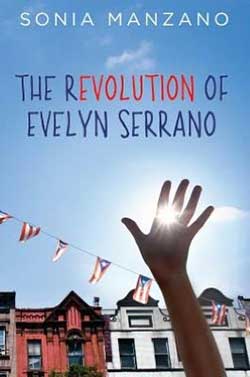For my teen literature class last semester, I compiled a list of historical fiction titles as my end-of-term project. It was a fun list to put together, and I was shocked at how many historicals I'd read in recent memory. But what struck me about the list was how many books about certain eras there are. Take World War II, for instance -- one of the most fascinating periods in world history, for lots of reasons, and as you might expect there are tons of books on the subject. But look for teen books on other eras and you might be hard pressed to find anything at all, much less anything worth reading.
The 60's are one of those eras that tend to be somewhat untapped when it comes to teen lit. I can't figure out why -- maybe it's not long past enough to be truly historical for some? Not really sure, but it seems to me that I've read some really extraordinary books set during this turbulent timeframe. And it's a natural match to the turmoil of adolescence, with all the uncertainty and the shades of black and white fading into gray in so many areas of life. Seems like gold to a novelist, I would think.
And that's certainly true of the debut novel by Sonia Manzano, The Revolution of Evelyn Serrano. Manzano's name probably sounds familiar -- she's best known as the actress who plays Maria on Sesame Street. I'm not ashamed to admit that Sesame Street made a huge impact on me, as it did to so many of us babies of the 1970s. The second I read about Manzano's book, it went on my reading list, because, hello? It's Maria! And I'm so glad I jumped at it, because this affecting, emotional novel is truly a gem that deserves a spot on every reading list.
Evelyn Serrano used to be known as Rosa Maria, but when she turned 14 she decided a name change was in order. Besides, there are entirely two many Rosas and Marias in her Spanish Harlem neighborhood, and Evelyn doesn't want to blend in. She also doesn't want to be like her Mami, clinging to the ways things were in Puerto Rico, fashions and decorating and all of that. So she's breaking out on her own a bit, and things are going pretty well -- until her abuela turns up, Mami's mother from Puerto Rico. Abuela's not like any of the other grandmothers - she's sassy and brash and she knows things, political things, that Mami never wants to talk about. Evelyn's drawn to Abuela and her politics, and before long all three of the Serrano women are embroiled in activism, as the Young Lords, a protest group, make a stand in Evelyn's Spanish Harlem neighborhood.
Manzano may be on her first outing as a novelist here, but her talents for characterization are clearly well-honed. Evelyn is a believable and interesting narrator, one modern readers will identify with as she struggles to find her footing in a world of upheaval and uncertainty. The issues Evelyn faces -- issues of family, politics, love, and identity -- are universal, which makes their placement amidst this historical setting all the more powerful. Personally I didn't know much at all about the Young Lords, and I found Manzano's account not only stirring but informative. Much like Rita Williams-Garcia's stellar novel One Crazy Summer, and its depiction of the Black Panthers, Manzano's novel gives us a side of the conflict in Spanish Harlem that most of us may not fully understand. All this while keeping the action moving, an impressive feat for a debut novelist.
More than just a book about politics, though, Revolution is ultimately a book about a young girl, and the transformation she undergoes not only with how she sees herself but how she understands her friends and family. The relationship between Evelyn and her mother is a thorny one (much like that between Mami and Abuela), and Manzano shows us the whole thing, unstintingly. These are real people, which makes them all the more complex and interesting - and ultimately, believable.
I can't wait to read more from Manzano, and I'm thrilled that her recent Pura Belpre honor for this title will take her book to that much wider an audience.
The Revolution of Evelyn Serrano by Sonia Manzano, published by Scholastic
Ages 12 up
Source: Library
Sample: "At the kitchen table sat a woman whose eyebrows were drawn on with a black makeup pencil. On her eyelids was a thick spread of eye shadow the same blue as my snow cone. The woman's lips were as pink as the inside of a seashell. And, oh, her hair -- it was as orange as Bozo's, puffed up and piled on top of her head like a wad of cotton candy. Mami was serving this strange lady a cup of coffee. / Mami spoke in a very tired way. 'Mija, this is your abuela.'"
Recommended


No comments:
Post a Comment